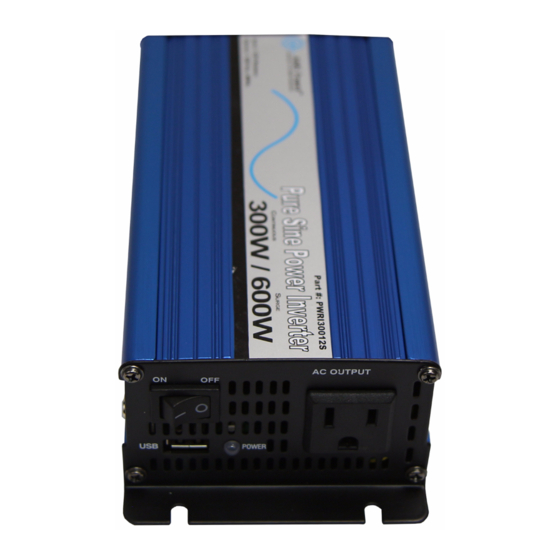AIMS Power PWRI30012S Gebrauchsanweisung - Seite 4
Blättern Sie online oder laden Sie pdf Gebrauchsanweisung für Inverter AIMS Power PWRI30012S herunter. AIMS Power PWRI30012S 10 Seiten. Dc to ac pure sine power inverter

5. We recommend mounting the inverter on something stable to prevent it from
bouncing. Impact shock could result in damage to your unit. Be sure to use all
four mounting screws for optimal stability. Mount in a location that can support
the weight of the inverter.
6. Allow 12 inches of space around the inverter to prevent objects from blocking the
vents and to provide enough air to circulate.
7. Do not install the inverter in an environment with high dust, saw dust residue or
other particles that may get sucked into the inverter increasing internal
temperature.
8. There will be some electrical arcing or spark when the inverter connects with the
battery. Combustible materials such as gasoline, alcohol, etc. should not be
around the inverter.
E. BATTERY
1. The battery is designed to supply the inverter with DC input voltage and the rated
voltage should be in accordance with the rated input voltage of the inverter. Any
voltage exceeding the range of the input voltage of the inverter will cause the
inverter to go into overload and could possibly damage the inverter. The battery
should supply enough current for the load. The load is the amp or watt rating of
the equipment being powered by the inverter. A small capacity battery cannot
provide enough power for large electrical equipment. In this case, the battery will
cause the inverter to go into under voltage protection because of the load put on
the battery. A simple way to calculate the load or amps required from your battery
is to divide watts of equipment by battery voltage. Due to the consumption of the
inverter itself, the actual current will be about 10% more. For example, the voltage
of lead acid battery is 12VDC, and load of the equipment is 1000W, therefore, the
actual current needed from the battery is about 1000W / 12V = 83.3 amps per
hour. Add 10% for efficiency loss and you get 83.3 * 1.10% = 91.6 amp per hour
needed. If you don't know the wattage of your equipment, you can figure the
wattage by multiplying AC amps by AC voltage. For example, a refrigerator is 8
AC amps * 120 Volts AC = 960 watts. Remember, all equipment has a start-up
requirement 3-5x its running wattage. In this example, 960 watts * 3 = 2880 watts
needed from the inverter so don't size your inverter too small.
2. Battery operating time depends on battery capacity and load. The formula for
operating time is: battery capacity divided by the value of the load divided by
battery voltage times 1.10%. For example, using the numbers from above, the
battery specification is 12V, 200Ah capacity and the load is 1000W. Take battery
capacity 200Ah / 91.6 amps = 2.18 hours of run time if you fully deplete the
battery. This is NOT recommended. Deep cycle batteries last longer when they
are only depleted to 50% of capacity.
4
